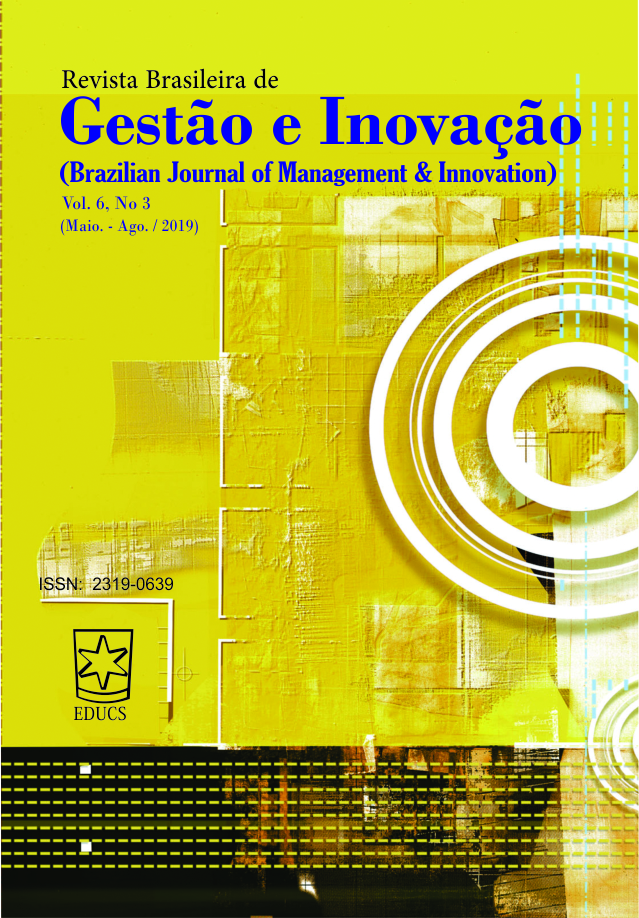INOVAÇÃO, ALIMENTOS E CONSUMO: ANÁLISE DA PRODUÇÃO CIENTÍFICA E SUAS IMPLICAÇÕES | INNOVATION, FOOD AND CONSUMPTION: SCIENTIFIC PRODUCTION ANALYSIS AND ITS IMPLICATIONS
Keywords:
Consumo, inovação, alimentos, bibliometria, mineração de texto.Abstract
Os alimentos são percebidos como fonte prazer e de bem-estar físico, mas também de preocupação e estresse, estando as preocupações relacionadas à (in) segurança, origem e saudabilidade dos alimentos. Atualmente, verifica-se que os indivíduos vivem em um constante paradoxo, pois de um lado há o desejo de inovar (neofilia), mas por outro, há o receio ou medo do não familiar (neofobia). Destaca-se, também, que a taxa de inovação na indústria brasileira de alimentos está aumentando gradativamente. Frente a esse contexto, objetivou-se analisar a produção científica a respeito das inovações alimentares por meio da técnica de mineração de texto. Para tanto, foram analisados 555 artigos publicados no Web of Sicence entre 2004 e 2014. Os resultados revelaram o aumento das publicações relacionadas a temática a partir de 2009, reforçando sua importância como tema de pesquisa. As áreas do conhecimento que mais se destacaram foram: Tecnologia de Alimentos, Agricultura, Economia e Nutrição. Entre os países que mais publicaram estão os Estados Unidos, Inglaterra, Holanda e Itália. Os conteúdos relacionados à segurança alimentar e alimentos geneticamente modificados apresentaram presença significativa, assim como mudanças climáticas e alegações de saúde. Por outro lado, a expressão “comportamento do consumidor” foi a que apresentou menor frequência. As implicações desses resultados para o mercado são apresentadas no estudo.
-----
DOI: 10.18226/23190639.v6n3.07
Priscila Caroline Souza Paiva Dias, Universidade do Estado de Mato Grosso (UNEMAT). Brasil.
E-mail: priscila.paiva@hotmail.com
Caroline Pauletto Spanhol Finocchio*, Universidade Federal de Mato Grosso do Sul (UFMS). Brasil.
E-mail: carolspanhol@gmail.com
Thelma Lucchese Cheung, Universidade Federal de Mato Grosso do Sul (UFMS). Brasil.
E-mail: thelma.lucchese@ufms.br
Submetido: Maio 2018
Aceito: Setembro 2018
*Contato para Correspondência
Downloads
Published
How to Cite
Issue
Section
License
The author must guarantee that:
- there is full consensus among all the coauthors in approving the final version of the document and its submission for publication.
- the work is original, and when the work and/or words from other people were used, they were properly acknowledged.
Plagiarism in all of its forms constitutes an unethical publication behavior and is unacceptable. Revista Brasileira de Gestão e Inovação has the right to use software or any other method of plagiarism detection.
All manuscripts submitted to RBGI - Revista Brasileira de Gestão e Inovação go through plagiarism and self-plagiarism identification. Plagiarism identified during the evaluation process will result in the filing of the submission. In case plagiarism is identified in a manuscript published in the journal, the Editor-in-Chief will conduct a preliminary investigation and, if necessary, will make a retraction.
This journal, following the recommendations of the Open Source movement, provides full open access to its content. By doing this, the authors keep all of their rights allowing Revista Brasileira de Gestão e Inovação to publish and make its articles available to the whole community.
RBGI - Revista Brasileira de Gestão e Inovação content is licensed under a Creative Commons Attribution 4.0 International License.
Any user has the right to:
- Share - copy, download, print or redistribute the material in any medium or format, linking to RBGI site.
- Adapt - remix, transform and build upon the material for any purpose, even commercially.
According to the following terms:
- Attribution - You must give appropriate credit, provide a link to the license, and indicate if changes were made. You may do so in any reasonable manner, but not in any way that suggests the licensor endorses you or your use.
- No additional restrictions - You may not apply legal terms or technological measures that legally restrict others from doing anything that the license permits.
#RBGI







